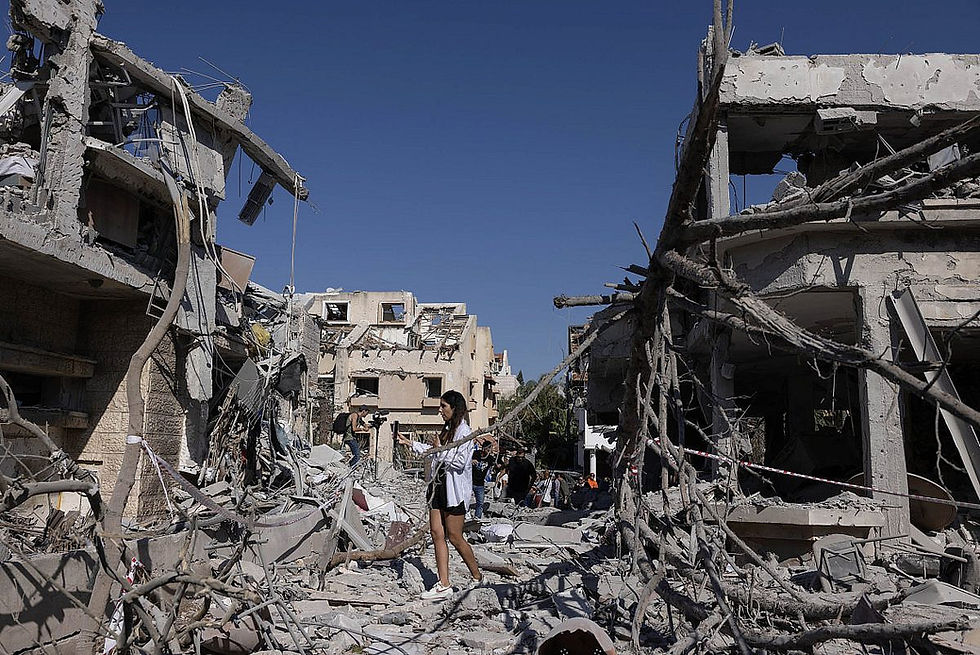A War We Didn’t Choose - But Must Fight
- rotemaoreg
- Jun 20, 2025
- 4 min read

Dear friends and supporters,
One week ago, Israel entered into an open, direct war with the Islamic Republic of Iran.
This is not just another round of escalation. It is a pivotal moment - long feared, now real. And it demands strategic honesty and moral clarity.
At LIBRAEL, we are committed to pursuing peace, practicing diplomacy, and protecting liberal values. We are also committed to Israeli interests - first and foremost, its right to defend itself when faced with existential threats.
That is why we support this war. As we are committed to transparency, we wanted to elaborate on our stance. We encourage to use our answers if you find them helpful in your day-to-day conversations on this issue.
We also encourage you to reach to us by email or social media if you want to hear more.
1. Why did the war start now?
The Israeli intelligence community has reached the conclusion that we’ve arrived at a “now or never” moment vis-à-vis Iran's nuclear program.
Unless Israel acts now, Iran will, within a matter of days, enrich enough uranium to weapons-grade levels - sufficient for one nuclear bomb.
While it is uncertain whether Iran currently has the capability to turn this enriched uranium into a functioning nuclear warhead, Israel believes it cannot afford to take that risk.
2. Why do we believe this war is not politically motivated?
Some accuse the Israeli government of launching this war to distract from domestic troubles, from the "draft law" to the failure to safely return the hostages in Gaza.
All elected officials make political calculations when making decisions, and Prime Minister Netanyahu is no exception, yet we reject the claim that this war is solely the result of one person’s political needs.
The security and intelligence communities are unanimous regarding the need to act (a level of agreement never before seen on this issue). Israel’s opposition leaders, who are not shy about criticizing the government on other issues, especially Gaza, support as well.
Those serve as proof that this is not about internal politics - it’s about national security.
3. Why do we support the war?
Wars are frightening, painful, and dangerous.
Dozens of Israelis and hundreds of Iranians have already been killed, and both countries are suffering enormously.
This war is not a war of choice, as Israel already has enough conflicts on its plate, and it is definitely not about revenge.
It is about degrading Iran’s offensive capabilities and preventing a nuclear threat on Israel and the region.
4. What does a desirable outcome look like?
Let us be clear: a desirable outcome is not endless war.
While some call for regime change, we know from history - particularly the war in Iraq - that such outcome can be risky and unpredictable.
We all agree that a pro-west, liberal, democratic Iranian government would benefit the entire region (especially the Iranian people), but we must recognize that this is not the only end-state possible.
Instead, a more realistic goal is a reality in which Iran is no longer an existential threat but merely a regional nuisance.
If Iran is deprived of its nuclear infrastructure, its ballistic missiles, and its regional proxy network, its threat to Israel and the region will be significantly weakened.
LIBRAEL will support any diplomatic agreement that can ensure these objectives.
5. Why do we want the United States to stay out of the war?
American support matters, and we are grateful for it, but Israel has never asked others to defend it - and we’re not about to ask now.
U.S. military involvement will put American personnel in harm's way, drag the U.S. into an avoidable war, and cement the antisemitic trope that Israel dictates U.S. foreign policy.
The U.S. is our key ally, and we ask its support in terms of equipment, air-defense, and diplomacy, particularly enabling Israel to destroy the enrichment facility in Fordow - but we don't ask it to fight directly.
6. How do our liberal values apply during wartime?
Even in war, liberal values matter.
We call on the Israeli government to uphold the rule of law, to do everything it can to minimize civilian casualties, and to differentiate between the regime and the freedom-loving Iranian people.
Liberalism also means standing up to authoritarian aggression. Iran’s regime represses its own people and threatens its neighbors. Turning a blind eye to its oppressive behavior would be a betrayal of our values.
7. What kind of peace are we fighting for?
Not a naïve peace - but a durable one.
One in which Israelis no longer live under the threat of Iranian missiles or a nuclear weapon, and where the Iranian people - like others in the region - can one day live free of dictatorship, oppression, and war.
We hope that day comes sooner rather than later.
At the same time, we do not delude ourselves into thinking that removing the Iranian threat will create a perfect Middle East.
We remain in conflict with our Palestinian neighbors.
There is a terrible human tragedy unfolding in Gaza, where Hamas is still in power, and 53 Israelis are still held hostage by it.
We will not know true peace until we fulfill our liberal Zionist vision: Israel as a secure, prosperous, democratic nation-state of the Jewish people, and Palestinians living in liberty, security, opportunity, and dignity.
We still believe in that future.




Comments